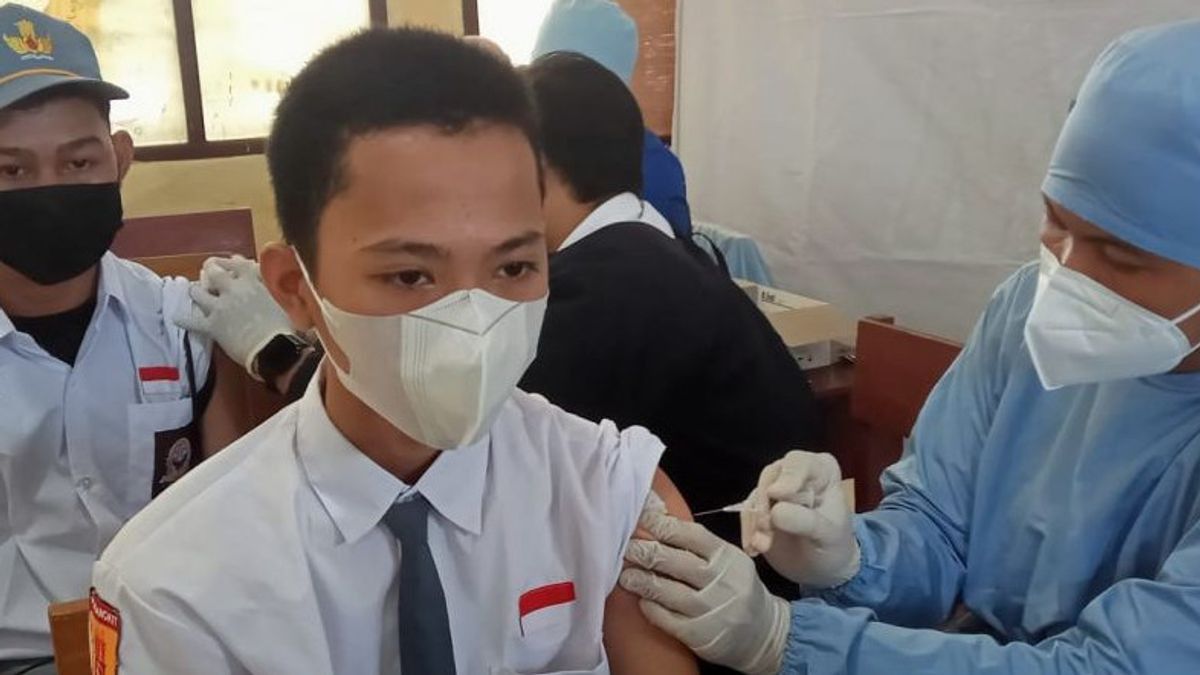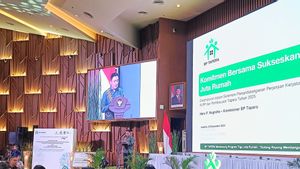JAKARTA - The news of the increasing number of pediatric patients suffering from pneumonia has become a conversation on Twitter's timeline. Not a few netizens have returned to being paranoid about the spread of COVID-19. The question is, why even though the vaccine is above 90 percent, herd immunity has not yet occurred?
This news comes from the upload of the Twitter account owner @desperadro. He claimed to work at one of the Regional General Hospitals (RSUD) in Jakarta.
"At the RSUD suddenly there are so many pediatric patients with pneumonia until the pneumonia room is full. It's a sign that we have started to be careless with social distancing and health procedures," wrote @desperadro.
Indeed, the account does not say that all pneumonia cases are related to COVID-19. But according to medical rules, pneumonia patients must be suspected of being COVID-19 until their PCR test results are negative.
"All children with pneumonia during the pandemic until the PCR results come out negative must be suspected of COVID-19. So we still need vigilance," he tweeted.
COVID-19 paranoiaAt the hospital, suddenly there were so many pediatric patients with pneumonia until the pneumonia room was full. It's a sign that we have started to be careless with social distancing and prokes.
— droo (@desperadroo) October 24, 2021
At the time of writing, @desperadro's tweet has been retweeted 8.6 thousand times and has been liked 32 thousand times. Meanwhile, not a few netizens are worried that COVID-19 will spread widely again.
The owner of the account @imandangodaan, for example, said the hospital where he worked had not treated COVID-19 patients for four weeks. "Eh, someone broke an egg this morning. Just follow the procedure, okay?"
Meanwhile, @andikprayog3 in his comment admitted that he was worried when he read a tweet about COVID-19. "Why is it that every time you read a COVID-19 tweet, your breath becomes irregular."
Some netizens also highlighted the face-to-face learning policy for elementary school children who in fact have not received the vaccine. "Again, it's really strange that people who are vaccinated aged 12-17 years, who enter PTM for elementary school children," wrote @ranniafrs.
"Leave a message for teachers who read, don't be careless, yes. So the security guard for the children's progress in every classroom. Don't be carried away and be firm," said the account owner @_anjar.
Epidemiologist from Griffith University, Dicky Budiman explains why pneumonia is closely related to COVID-19, although not necessarily. First he explained that the symptoms of these two diseases are indeed similar.
"Pneumonia is inflammation of the lungs. Among other things, it is characterized by high fever, shortness of breath, cough. Because the air sacs in the lungs are filled with fluid. It could be due to bacterial or viral infection, one of which is the virus that causes COVID-19," explained Dicky to VOI.
"Therefore, to confirm it, it is necessary to examine the PCR test. Apart from the thoracic examination," said Dicky.

It's been a few weeks since the trend of COVID-19 cases has continued to decline. Last October 24, the average number of COVID-19 cases in seven days was 752 people. This number is much smaller than the average figure of seven days a week earlier or on October 14, which was 1,087 cases.
In DKI Jakarta itself, the daily trend of adding positive cases of COVID-19 is decreasing. On October 25 today, for example, the number of positive cases recorded was 82 people. This number is smaller than the previous day as many as 129 people.
Meanwhile, the number of recovered patients in Jakarta has an increasing trend. Today, the number of recovered COVID-19 patients was recorded at 167 people. This number is more than yesterday, which was recorded at 129 people.
Meanwhile, as of October 2021, the Jakarta 1 dose of COVID-19 vaccination has reached more than 10 million people or 116.9 percent of the targeted Jakarta vaccination target of 8,941,211 residents. Of the 10.5 million people who have been vaccinated, 65 percent or 6.8 million people are residents with Jakarta ID cards and 35 percent or 3.7 million are non-DKI KTP residents.
This means, there are still as many as 2.1 residents of DKI Jakarta who are targeted for vaccination, have not received any vaccinations at all. Meanwhile, the total dose 2 has reached 7,744,565 people or 86.6 percent with the proportion of 66 percent of residents with Jakarta ID cards and 34 percent of residents with non-DKI ID cards.

Even though the transmission rate has decreased considerably and Jakarta's vaccinations have been extremely high, even exceeding the threshold recommended by the World Health Organizatin (WHO), the public still seems to have to be vigilant. The reason is, high vaccination does not necessarily guarantee the creation of group immunity or herd immunity.
Epidemiologist Dicky Budiman says we need to manage expectations for herd immunity. The process is still long, said Dicky.
"Diseases that are tried to be controlled by vaccination, require a fairly long stage to reach a status called herd immunity. Because herd immunity has criteria that do not only cover vaccination coverage," explained Dicky to VOI.
Even though according to Dicky, 96 percent of the total population of Indonesia has been vaccinated with even two doses, it does not mean that herd immunity has been achieved. "The understanding is not like that. But Jakarta has reached the threshold of a true vaccine."
Dicky explained that there are other variables that determine an area can achieve herd immunity. Among other things, the reproduction number of the spread of the virus must be as small as possible.
In addition, Dicky also said that there are still variables that are difficult to answer until now, namely the effectiveness of the vaccine itself. "One thing that remains unanswered is the effectiveness of the vaccine at preventing transmission."
"Even countries such as Israel and Canada that use vaccines with high effectiveness, still cannot claim the achievement of herd immunity. Even though the vaccination coverage is far above 50 percent, it cannot be called herd immunity," said Dicky.
*Read other information about COVID-19 or read other interesting articles from Ramdan Febrian Arifin.
Other BERNASThe English, Chinese, Japanese, Arabic, and French versions are automatically generated by the AI. So there may still be inaccuracies in translating, please always see Indonesian as our main language. (system supported by DigitalSiber.id)










